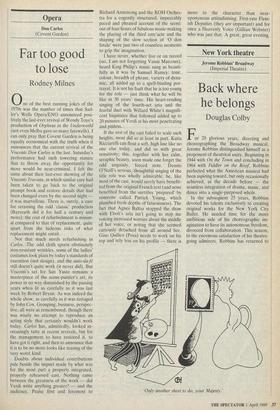Opera
Don Carlos (Covent Garden)
Far too good to lose
Rodney MIlnes
0 ne of the best running jokes of the 1970s was the number of times that Sad- ler's Wells Opera/ENO announced posi- tively the last-ever revival of Wendy Toye's production of Orpheus in the Underworld (not even Melba gave so many farewells). I can only pray that Covent Garden is being equally economical with the truth when it announces that the current revival of the Visconti Don Carlos is the last. Saturday's performance had such towering stature that to throw away the opportunity for more would be near-criminal. I felt the same about their last-ever showing of the Visconti Traviata, in which similar care had been taken to go back to the original prompt book and restore details that had been changed even by the second night it was marvellous. There is, surely, a case for retaining the odd 'classic' production (Bayreuth did it for half a century and more): the cost of refurbishment is minim- al compared to that of replacement, quite apart from the hideous risks of what replacement might entail.
Not that much needs refurbishing in Carlos. The odd cloth sports obstinately iron-resistant wrinkles, some of the ladies' costumes look plain by today's standards of execution (not design), and the auto-da-fe still doesn't quite work (it never did). But Visconti's set for San Yuste remains a masterpiece of the scene-painter's art, its power in no way diminished by the passing years when lit as carefully as it was last week by Robert Bryan. As was indeed the whole show, as carefully as it was restaged by John Cox. Grouping, business, perspec- tive, all were as remembered, though there was wisely no attempt to reproduce an acting style that certainly wouldn't work today. Carlos has, admittedly, looked in- creasingly tatty at recent revivals, but for the management to have restored it, to have got it right, and then to announce that it is to be no more looks like teasing of the very worst kind.
Doubts about individual contributions pale beside the impact made by what was for the most part a properly integrated, properly rehearsed cast. Nothing came between the greatness of the work — did Verdi write anything greater? — and the audience. Praise first and foremost to Richard Armstrong and the ROH Orches- tra for a cogently structured, impeccably paced and phrased account of the score: out of four hours of fabulous music-making the playing of the third entr'acte and the shaping of the slow section of '0 don fatale' were just two of countless moments to grip the imagination.
I have never, whether live or on record (no, I am not forgetting Vanni Marcoux), heard King Philip's music sung as beauti- fully as it was by Samuel Ramey: tone, colour, breadth of phrase, variety of dyna- mic, all added up to a spell-binding por- trayal. It is not his fault that he is too young for the role — just think what he will be like in 30 years' time. His heart-rending singing of the fourth-act aria and the fearful duel with Willard White's magnifi- cent Inquisitor that followed added up to 20 minutes of Verdi at his most penetrating and pitiless.
If the rest of the cast failed to scale such heights, most did so at least in part. Katia Ricciarelli can float a soft, high line like no one else today, and did so with great sensitivity; this, together with her calm, seraphic beauty, soon made one forget the odd ungainly, forced note. Dennis O'Neill's serious, thoughtful singing of the title role was wholly admirable; he, like most of the cast, would surely have benefit- ted from the original French text (and none benefited from the surtitles 'prepared' by someone called Patrick Young, which plumbed fresh depths of fatuousness). The fact that Agnes Baltsa stopped the show with Eboli's aria isn't going to stop me voicing increased worries about the middle of her voice, or noting that she seemed curiously detached from all around her. Gino Quilico (Posa) needs to work on his top and rely less on his profile — there is more to the character , than near- eponymous attitudinising. First-rate Flem- ish Deputies (they are important) and for once a Heavenly Voice (Gillian Webster) who was just that. A great, great evening.


















































 Previous page
Previous page